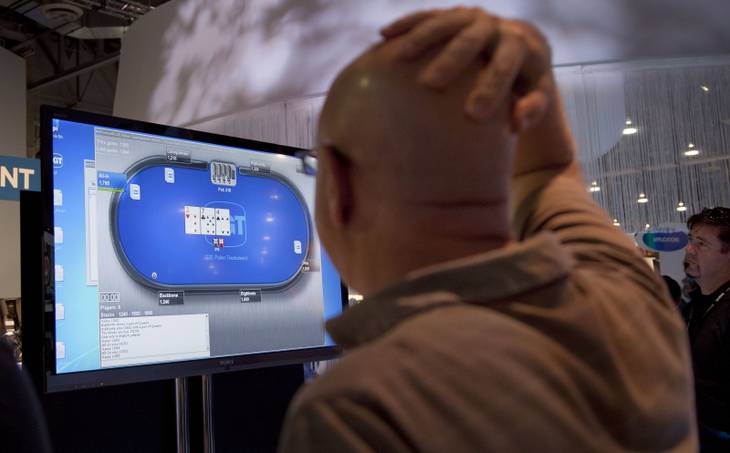It’s a question that’s loomed over the gambling industry since Internet gaming became a reality: In a battle between brick-and-mortar casinos and online casinos, who wins?
At the 15th International Conference on Gambling and Risk Taking, hosted by UNLV at Caesars Palace this week, industry experts and players made their cases in a panel moderated by Joshua Smith of Colliers International Gaming Group.
Here’s a look at some highlights of their discussion.
General thoughts on Internet Gaming:
Mark Lipparelli, former chairman of the Nevada Gaming Control Board: “Nevada was the first jurisdiction in the U.S. to develop a comprehensive set of gaming regulations dealing with Internet gaming and recently Ultimate Gaming went live and took the first live U.S. wager over the Internet.
“There’s a lot of pride in the work that’s been done by my former agency. I don’t take a lot of credit for that. We had several people within the agency step up and do a study of a lot of what was going on around the world, and we took piece parts of what thought was good and bad and hopefully constructed a good initial set of regulations and operating procedures that people will have to follow.
“Most certainly those will be revised. Once live, we’ll discover where we pushed too hard and probably discover where we didn’t push enough in public policy relating to the area of Interactive gaming.”
Tom Breitling, CEO of Ultimate Gaming: “We’re proud of that fact, but it also comes with huge responsibility. The governor actually empowered the state of Nevada to take the lead, and it’s really no surprise that Nevada took the leadership role. And everyone was talking about it, but Nevada did it, and our company got engaged about three years ago.
“It’s been over a decade that we’ve been looking at this. This is a fascinating time for this industry. It’s really the emergence of a new industry or the extension of the gaming industry.
“For the first time, we’ve actually generated tax revenue as a result of regulated online gaming. Our company now has over 100 employees, and most of the hiring is happening right here in Nevada. So jobs and taxes are coming back to America. And hopefully the leadership of this industry will come back to America. I think that it’s very real. A lot of people talking about it.”
Jon Porter, CEO of Porter Gordon Silver Communications, Washington D.C.: “I am concerned today, unlike I’ve ever been before, for the future of Nevada and the future for Las Vegas. From a Nevada perspective, we are at a turning point. Where are we going to be in the Internet Gaming world?
“We certainly have the experts who certainly have the bricks-and-mortar companies that are trying very hard, but I think from a priorities perspective, even my friends in the Nevada Legislature spent about 30 minutes talking about Internet Gaming. It is one of the No. 1 issues facing our future as a community, as a business community and as a state. We are seeing gaming expanding, and if we’re not cautious, if we’re not careful, our friends in California and our friends in New Jersey are going to move past us.
On how I-gaming will impact land-based casinos:
Breitling: “What the reality is is that this is going down a state-by-state path. There’s two diverging paths here. New Jersey has passed full-blown online casino gaming, So, just imagine a casino on your smart phone, and their revenues have been down. Nevada has seen a little bit of a rebound. I think there’s a lot of sensitivity around what to approve. There’s a lot of reasons why poker-only legislation makes sense and one of them is to protect land-based interests.”
Lipparelli: “I think the question of cannibalization is a difficult one. No one I think has a precise answer. I look at that from the perspective of a channel of distribution and whether’s there’s overlap and what kind of opportunities exist to attract a whole new generation of customers to resorts.
“The kids that are growing up with Facebook and social gaming are not necessarily a traditional customer that a brand would go after, but that is a potential exposure of an idea or a concept or games that might ultimately turn those people into customers. There was talk in the early ‘90s about whether the Internet would ever really have a place in gaming. I think that question has been answered. There’s a robust world of social gaming that’s going on, and those world’s are finally colliding.
Porter: “There’s been a lot of precedence set. You fly on a plane, you walk down the street, the world is now lit up with an iPad or an iPhone or a personal electronic device. I think that our industry is rapidly trying to create that customer base. But we cannot be fooled that there aren’t bigger brands than Nevada. I think that’s what our industry is trying to capture.
Porter on why Federal Legislation is so important: “One of the best things that we can do to help responsible gaming is to have framework nationally, so there is a threshold for our industry. Now, we’re busy fighting each other, because the language wasn’t perfect. Next year, I hope we’re here talking about how we can craft and improve upon a piece of federal legislation. We need an ability to regulate the industry.

